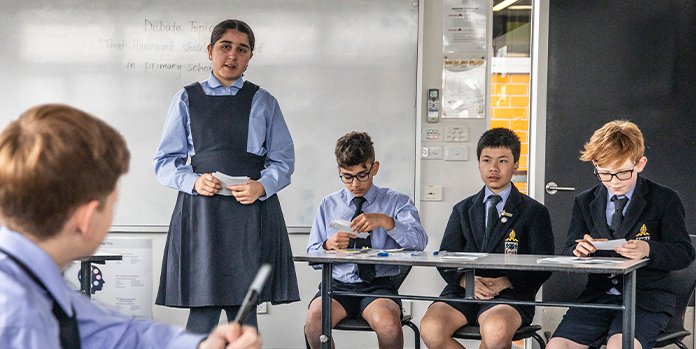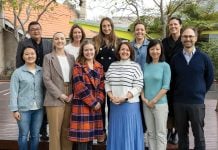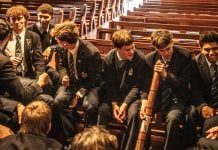Curiosity is a spark that sets minds ablaze, and learning is an adventure that knows no bounds. The classroom is where much learning happens, but some students like additional challenges. Enrichment and extension opportunities are therefore provided across all three campuses of Melbourne Grammar School for students to explore, engage, and excel in areas that interest them.
The difference between enrichment and extension
Extension opportunities typically allow students to delve deeper and forge a profound connection with a specific discipline. Some of this occurs in the classroom, but there are many other initiatives which occur each year.
This year, for example, they included offering first year university units in mathematics, participating in an interschool forum on STEM opportunities, or putting philosophical ideas into practice in the Ethics Olympiad. These are in addition to subject-based competitions that students are encouraged to enter in mathematics, science, geography, history and languages.
Enrichment, on the other hand, widens the horizon, broadening learning opportunities and experiences beyond the regular curriculum. For example, a group of Year 10 students recently participated in a Global Youth Forum on-line with students from Singapore and Indonesia, and many of our students relish the debating program that begins in Grimwade House and continues to Year 12.
Readers of Grammar News will have also seen a set of articles written by students in the magazine this year. A list of these articles is provided below.
Who can participate?
Participation in such activities is a mixture of invitation and self-nomination. A program such as the Da Vinci Decathlon competition is limited to eight students per year level in a school team, whereas the Computational Linguistics Olympiad is open to all, and annually sees almost 10% of the senior school cohort wrestling with fiendishly difficult problems of language and logic.
Melbourne Grammar’s program is therefore not constructed around a small group of elite academic achievers; rather, it is curated to provide targeted opportunities for students with a range of different skills and interests.
The educational philosophy of the program can be understood with reference to Lev Vygotsky and his “Zone of Proximal Development”, whereby extension activities are designed to be close enough to a student’s current abilities for them to see their potential, but far enough away to force them reach and grasp beyond their present safe zone of understanding, while being scaffolded by a teacher.
In this way, students learn to take some risks, but also develop confidence in their own capacity for improvement and development.
Overall, we aim to foster an approach to learning that is not simply about units and grades, but one where students can be thrilled by the excitement of discovering new vistas of knowledge and understanding.
Martin Ball
Head of Enrichment and Extension
Adrienne English
Enrichment Coordinator (Grimwade House)
2023 Grammar News articles written by students
Bringing nature back into the urban environment by Haidar Bashir, Year 11.
Year 6 takes a hands-on course in sustainability by Year 6 students, Will Day and Julia Lin.
New friends, new experiences by Lachlan Mar, Year 7.
Bearing the weight of history by 2023 Captain of the School, Daniel Cash.
Stanley Melbourne Bruce, a life of service by Marcus Allen, Year 12.
An Old Melburnian at the top of his game by Thomas Amarasekara, Year 10.
A new opportunity for everyday engagement with art by Rudransh Kohli, Year 9.
Aladdin Jr: a magic carpet ride by Year 6 students, Will Downing and Angelina Singh.
When Leo interviewed Annette… by Leo Marchesani, Year 6.
Tourism and its impact on Philip Island by Year 11 student, Leo Li.
Building connections and sharing ideas through art by Liam Craig, Year 10.
Finding the true ‘spirit of cricket’ by Year 11 student, Charlie Terry.
Why we all care about I-CARE by Year 6 students by Tom Anderson, Gisele Karafili and Kaeleb Sanghvi.



